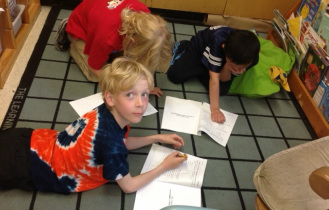Since my students, too, were eager to meet "Ms. Teschow's twins", we finally arranged a date that would work for a classroom visit.
It was a revealing experience, for everyone, I think...
At first, my students were bemused to see "invaders" in their classroom (I had not announced the exact date of Alex and Simon's visit), but they soon incorporated their two new classmates-for-the-day as though they were a regular part of the classroom.
I think the boys were surprised to see so much "work" going on; although my classroom is considerably different from some of the classrooms they've experienced, both in terms of physical layout and flow of the instructional day, there is a high expectation that students are working on whatever it is they need to work on, and I am frequently on hand to guide small groups, and to conference with individuals, be it in math, literacy, or at other points throughout the day. In general, everyone was busy at all times.
Most revealing to me though were the "special ed" aspects of the day: Although his teacher had mentioned it in an email to me recently, I was interested to see how much one of my twins stood during class time. I have noticed his difficulty sitting at the dinner table, and observing him as a student today, I could see that a traditional desk and chair would never work for this child; he literally stood for most of the day, either at a taller desk or counter in my classroom, to complete any written work!
(I was reminded of an early encounter I had as a Program Resource Teacher a few years back, when I was consulting with a contained class teacher, who wondered aloud what to do with some of her more "physical" students -- when I suggested replacing their chairs with theraband balls to "sit"/bounce on at their desks, she was appalled: "We're not in therapy here", she hissed, "this is a classroom!" I shuddered to think how stifled the students in her class must feel.)
In addition to the standing, I was also allowed to glimpse into the mind of the LD child... after school was done and the students had gone home, Alex, Simon and I debriefed the day together over snacks, before beginning our respective homework. They wanted to know about certain students in the room, and we talked about how one of the boys they had been hanging out with seemed really smart, but struggled to articulate his ideas, especially in writing.
"The hardest part is getting it out!" noted Alex, who was recently diagnosed as Intellectual Gifted, with a Learning Disability.
"I wish you could just think it in your brain... " he mused, "Sometimes I know what I want to say, but I can't get it out of my mouth or my hand to write," he noted.
My son articulated what so many of the students I've taught over the past 17 years have probably been thinking. And I, ashamed, reflected on how often I've brushed those kids aside as "not too bright", even though I know, intellectually, that they are probably smarter than their products demonstrate.

My teacher brain could learn something from my parent heart.


 RSS Feed
RSS Feed